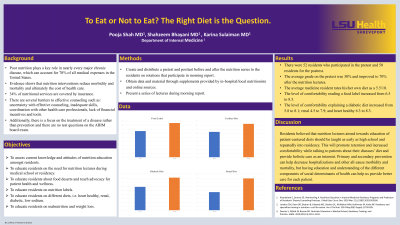Tuesday Poster Session
Category: Practice Management
P4072 - To Eat or Not to Eat? The Right Diet Is the Question
Tuesday, October 24, 2023
10:30 AM - 4:00 PM PT
Location: Exhibit Hall

Has Audio

Pooja Shah, MD
LSU Health Sciences Center
Shreveport, LA
Presenting Author(s)
Pooja Shah, MD, Shahzeem Bhayani, MD, Karina Sulaiman, MD
LSU Health Sciences Center, Shreveport, LA
Introduction: Nutrition plays a critical role in most chronic diseases. Evidence demonstrates that nutrition interventions can reduce the burden of these diseases, improve patient outcomes, and ultimately lower healthcare costs. However, there are several barriers that impede the effective education and counseling. These barriers include uncertainty regarding optimal counseling practices, inadequate skills and coordination among healthcare professionals, a predominant focus on treatment rather than prevention, and a lack of emphasis on nutrition on board exams. I have developed a curriculum aimed at enhancing healthcare professionals' knowledge and understanding of diets for common chronic conditions and conducted a QI project to assess the current knowledge and comfort regarding these diets.
Methods: A curriculum delivered by a series of lectures was created with nutritionists on diets for chronic conditions. Pretest and posttest surveys measured residents' attitudes, comfort, and knowledge. The posttest results evaluated the effectiveness of the curriculum in improving nutrition understanding. This project enhances resident education and promotes better care for patients.
Results: In our program, 52 out of 93 residents participated in the survey. Among the surveyed residents, 52% stated they had never been taught about nutrition. Residents rated their average dietary habits at 5.5/10. Prior to the lecture series, 48% of residents were aware of food deserts, which significantly improved to 88% in the posttest. The correct response rate for knowledge questions increased from 30% to 70% after the lectures. Comfort levels in reading food labels improved from 6.5 to 8.5, explaining a diabetic diet improved from 5.8 to 8.1, renal diet from 4.5 to 7.9, and heart-healthy diet from 6.3 to 8.3.
Discussion: The lecture series significantly improved residents’ knowledge and level of comfortability in discussing different diets. They embraced the opportunity to enhance their understanding and skills in providing patient-centered care and requested more educational sessions. By understanding and considering the social, economic, cultural, and environmental aspects that impact patients' lives, healthcare professionals can tailor their approaches and interventions to meet individual needs. This comprehensive education aids healthcare professionals with the necessary tools to provide optimal care for each patient, leading to reduced hospitalizations and improved patient outcomes.
Disclosures:
Pooja Shah, MD, Shahzeem Bhayani, MD, Karina Sulaiman, MD. P4072 - To Eat or Not to Eat? The Right Diet Is the Question, ACG 2023 Annual Scientific Meeting Abstracts. Vancouver, BC, Canada: American College of Gastroenterology.
LSU Health Sciences Center, Shreveport, LA
Introduction: Nutrition plays a critical role in most chronic diseases. Evidence demonstrates that nutrition interventions can reduce the burden of these diseases, improve patient outcomes, and ultimately lower healthcare costs. However, there are several barriers that impede the effective education and counseling. These barriers include uncertainty regarding optimal counseling practices, inadequate skills and coordination among healthcare professionals, a predominant focus on treatment rather than prevention, and a lack of emphasis on nutrition on board exams. I have developed a curriculum aimed at enhancing healthcare professionals' knowledge and understanding of diets for common chronic conditions and conducted a QI project to assess the current knowledge and comfort regarding these diets.
Methods: A curriculum delivered by a series of lectures was created with nutritionists on diets for chronic conditions. Pretest and posttest surveys measured residents' attitudes, comfort, and knowledge. The posttest results evaluated the effectiveness of the curriculum in improving nutrition understanding. This project enhances resident education and promotes better care for patients.
Results: In our program, 52 out of 93 residents participated in the survey. Among the surveyed residents, 52% stated they had never been taught about nutrition. Residents rated their average dietary habits at 5.5/10. Prior to the lecture series, 48% of residents were aware of food deserts, which significantly improved to 88% in the posttest. The correct response rate for knowledge questions increased from 30% to 70% after the lectures. Comfort levels in reading food labels improved from 6.5 to 8.5, explaining a diabetic diet improved from 5.8 to 8.1, renal diet from 4.5 to 7.9, and heart-healthy diet from 6.3 to 8.3.
Discussion: The lecture series significantly improved residents’ knowledge and level of comfortability in discussing different diets. They embraced the opportunity to enhance their understanding and skills in providing patient-centered care and requested more educational sessions. By understanding and considering the social, economic, cultural, and environmental aspects that impact patients' lives, healthcare professionals can tailor their approaches and interventions to meet individual needs. This comprehensive education aids healthcare professionals with the necessary tools to provide optimal care for each patient, leading to reduced hospitalizations and improved patient outcomes.
Disclosures:
Pooja Shah indicated no relevant financial relationships.
Shahzeem Bhayani indicated no relevant financial relationships.
Karina Sulaiman indicated no relevant financial relationships.
Pooja Shah, MD, Shahzeem Bhayani, MD, Karina Sulaiman, MD. P4072 - To Eat or Not to Eat? The Right Diet Is the Question, ACG 2023 Annual Scientific Meeting Abstracts. Vancouver, BC, Canada: American College of Gastroenterology.
